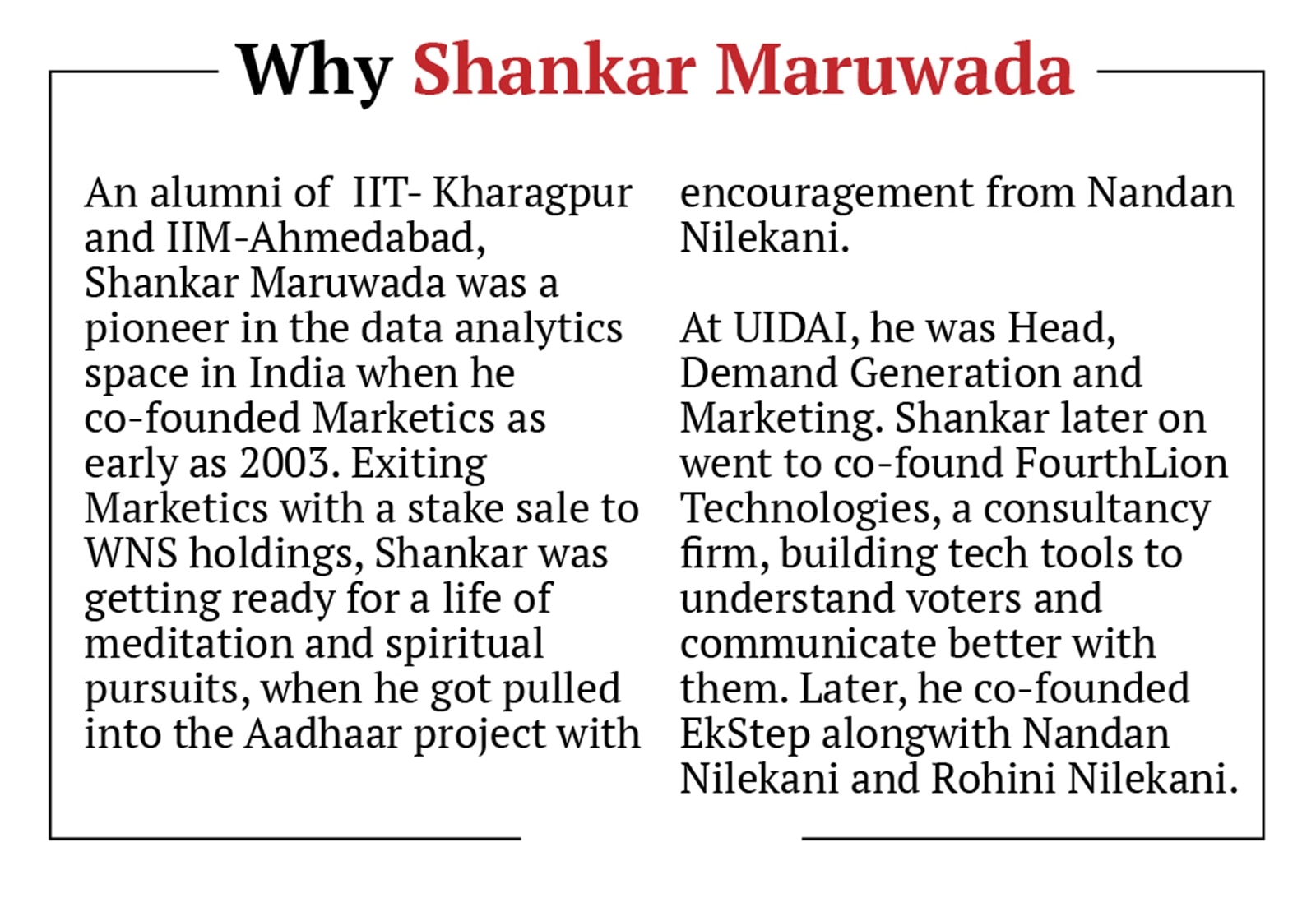India should be the use case capital for AI in the world: EkStep Foundation co-founder Shankar Maruwada
An alumni of IIT- Kharagpur and IIM-Ahmedabad, Shankar Maruwada was a pioneer in the data analytics space in India when he co-founded Marketics as early as 2003.
 Shankar Maruwada, CEO and co-founder of EkStep Foundation. (Express photo by Jithendra M)
Shankar Maruwada, CEO and co-founder of EkStep Foundation. (Express photo by Jithendra M)Shankar Maruwada is the CEO and co-founder of EkStep Foundation, a Bengaluru-based nonprofit creating tech-based platforms to transform school education, building ecosystems to understand the impact of AI and creating people-centric AI solutions to solve large societal problems.
EkStep is known for its role in co-creating DIKSHA, the world’s largest digital education platform, with the Government of India.
EkStep also funds think tanks and research programmes on AI in Indian languages, and is now working to dramatically alter the education and skilling landscape in India by building an UPI scale model for the sector with their ONEST network.
Shankar Maruwada, Nandan Nilekani and Rohini Nilekani are co-founders of EkStep, and the organisation has a large number of Aadhaar visionaries on its rolls.
Shankar spoke to indianexpress.com on how EkStep was building an ecosystem to understand AI and its impact on India, the need for a focus on foundational literacy and numeracy for school children, and building of digital public infrastructure solutions for the Indian landscape. Edited excerpts:
Venkatesh Kannaiah: Can you tell us about the broad areas that the EkStep foundation is working on?
Shankar Maruwada: We feel that the key to understanding the impact of technology is from the intentions of its creators and how it empowers its users. EkStep looks to shift paradigms, and perspectives, viewing tech themes from a larger societal lens using Digital Public Goods and Digital Public Infrastructure as levers to use tech for the common good.
First, we have built Sunbird, an open source, modular digital infrastructure which has been recognised as a Digital Public Good and is at the heart of DIKSHA, the largest edtech platform in the world and iGOT, India’s national platform for training Government officers and staff. Secondly, with the growing relevance of Artificial Intelligence we have built People+AI as a community of researchers, practitioners, startups and corporates and social impact organisations, all with a focus on AI and to study its impact on people. We are also looking to discover and demonstrate population-scale use-cases for AI in India, and come up with affordable and scalable solutions. Thirdly, we promote Societal Thinking, a think tank where we work alongside change leaders to enable impact at scale. Societal Thinking has engaged with more than 500 global change leaders in more than 20 countries. Fourthly, we are now working on ONEST(Open Network for Education and Skilling Transformation), which would be like a UPI for skilling and education in India.
Venkatesh Kannaiah: Can you tell us about the key tech interventions by Ekstep in improving the public education system in India?
Shankar Maruwada: EkStep was built after great deliberation and engaging everyone in the education sector — from techies to child psychologists to policy makers to children’s book writers to neuroscientists. There are many innovations that have come out of EkStep’s journey.
DIKSHA (Digital Infrastructure for Knowledge Sharing), a national platform for school education and an initiative of National Council for Educational Research and Training (NCERT), is one such product to come out of EkStep. DIKSHA is built on Sunbird, an open source, modular digital infrastructure which has been recognised as a Digital Public Good, built by EkStep.
 “We work on the philosophy of Samaaj- society, sarkaar-state and bazaar-market, where the balance between the state and the market would be resolved by a renewed focus on society,” Shankar Maruwada said.
“We work on the philosophy of Samaaj- society, sarkaar-state and bazaar-market, where the balance between the state and the market would be resolved by a renewed focus on society,” Shankar Maruwada said.
DIKSHA has been adopted by all states, and all boards across India. It is a learning platform for school students and a training platform for school teachers. It can be accessed by learners and teachers and administrators across the country and currently supports 36 Indian languages. It has already trained millions of school teachers across the country.
Teachers are being trained at a fraction of the cost and around 140 million digital learning certificates have already been issued. EkStep Foundation was the Open-Source Technology and Programme Management Partner of DIKSHA
The scale of this platform is mind boggling. There have been 5.5 billion learning sessions on this platform and 63 billion learning minutes of content has been consumed. And all of this in around 36 languages and 20,000 courses.
Adding value to the DIKSHA platform, we have also helped to insert QR codes in these textbooks, with 6,274 textbooks with a print run of more than 600 million copies having these QR codes. The student can scan the QR at the end of the page to go to additional content either in video or audio. It is like a book supplement but with QR codes. More than 3.5 lakh pieces of content has been enabled through these QR codes. We were the tech partner in this whole episode, the choice of what content or where the QR codes appear was entirely in the hands of the school boards.
Now, apart from DIKSHA, Sunbird has found application in training of civil servants across the country, with the iGOT Karmayogi platform. More than three million government employees from various departments are on the Karmayogi platform, upskilling themselves with new knowledge and it is a go-to training platform for civil servants. iGOT is run by Karmayogi Bharat, as part of Mission Karmayogi of the Government of India.
Sunbird Saral, another product, uses AI to digitise physical assessment submissions. This large scale collection of data helps in learning analytics, which could be useful for India’s education sector. Saral is being deployed by many Indian states and has helped capture over 300 million of student assessment sheets by teachers with a single click on their phone, thus dramatically reducing efforts to digitise and freeing up teaching time.
Venkatesh Kannaiah: At People + AI, what do you do?
Shankar Maruwada: At People + AI, we are trying to build an ecosystem of researchers, practitioners and startups. We also fund research into AI and specific research projects, apart from funding AI research centres at various academic institutions.
One of the projects we are working on is Open Cloud Compute, which is a Digital Public Infrastructure for computing. Over the next few years, demand for computing will go up due to increased digitalisation and AI, and the global cloud compute market is expected to triple in size. We are trying to build a compute ecosystem that is more competitive and affordable for India. We are building chatbots of the future, Jan Ki Baat, for large scale data collection by bots and gleaning insights on issues of common interest. In simple terms, instead of a person talking to a bot, a bot talks to a person and collects data at scale. We are also funding a centre at AI4bharat (at IIT Madras) for work on Indian language technology. The focus is building open-source language AI for Indian languages, including datasets, models, and applications. We are also working on virtualisation of physical addresses, STHAAN, but that is in its early stages.
 Shankar Maruwada
Shankar Maruwada
We have also been partnering with Bhashini, a National Digital Public Infrastructure for languages to develop services and products for citizens by leveraging the power of artificial intelligence. Bhashini project has already resulted in the creation of over 400 open source AI models in speech recognition, machine translation, text-to-speech, and optical character recognition across 22 Indian languages.
There is a lot of work going on in AI chatbots. As part of DIKSHA, we have built one for teachers, where they could avoid going into hundreds of manuals to find out an answer to a question of governance or of an administrative nature. This is part of NCERT’s e-Jaadui Pitara, which also has an AI assistant for parents and an AI bot that can generate stories for parents to tell their young children.
Venkatesh Kannaiah: At ONEST, what do you do? How does it work? Is it that you would call a DPI for education?
Shankar Maruwada: ONEST (Open Network for Education and Skilling Transformation) will be like an UPI in the field of education and skilling in India. Whether you are a student, an employer, an education provider or an edutech startup, or even a nonprofit working on education and skilling, you could all be part of the Network. It would solve the issue of trust, payment friction, digital identity and knowledge asymmetry in the ecosystem. it would be a one stop shop for information on scholarships, jobs, educational resources, and micro learning opportunities. It is not a portal, but a network like UPI. All education and skilling partners would be on the platform and it would work seamlessly. It has been piloted for the past one year and it is due for launch in a few months time. EkStep is doing this in partnership with ONDC, FIDE, Protean and other organisations who are co-creating and innovating on ONEST.
Let me give you a simple use case. If you want to fund say the payment of fees of 10 children from your district, you get on the platform, and a relevant nonprofit might be working with underprivileged school children in your district. The nonprofit and you team up virtually, pay the fees directly to the board, the nonprofit authenticates the recipients, sends you their exam details, and if need be marks scored or such information later on, all through the network. The question of trust, payment friction and knowledge asymmetry is all minimised. It is one use case, there could be hundreds, with a large number of education providers, micro learning platforms, students, scholarship seekers, scholarship providers and the like. Maybe, learning might prove to be much cheaper, and perhaps there could be micro learning courses for Rs 10.
Venkatesh Kannaiah: How do you work for the internationalisation of your products or ideas?
Shankar Maruwada: We are now funding a new Centre for Open Societal Systems (COSS) at IIIT-Bangalore, and are also looking at building DAAS or Digital Public Infrastructure As a solution for the Global South, working along with the Centre for Digital Public Infrastructure at IIIT- Bangalore.
You must understand that we build and visualise things at the scale of hundreds of millions. Many of those who are with EkStep are those who built large systems like Aadhaar and UPI. DIKSHA, the government edtech platform is already being offered to the global south as a Digital Public Good by the Government of India. We assume that most of the work that we do and the problems we solve with Indian use cases, particularly in AI, will have a large resonance in the Global South and would find takers. We want India to be the world’s use case capital for AI, and with the diversity we have, most of the AI themes and issues would need to be thrashed out here, before going in for large scale adoption. We work on the philosophy of Samaaj- society, sarkaar-state and bazaar-market, where the balance between the state and the market would be resolved by a renewed focus on society.







